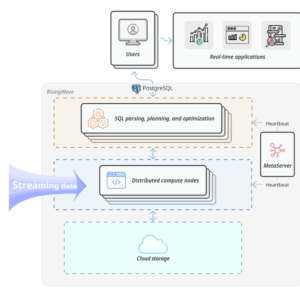

(wanpatsorn/Shutterstock)
Only the most advanced companies have overcome the technical complexity involved with processing streaming data in real time. One of the vendors aiming to reduce this complexity and make stream data processing available to the masses is RisingWave Labs, which today announced $36 million in financing.
The early days of stream data processing brought us stand-alone systems that were capable of acting upon vast streams of data, and doing so with low latency and reliability. Stream processing frameworks like Apache Storm made headway in addressing these challenges and led the way to more sophisticated frameworks like Apache Flink and others.
Things got significantly more complex when companies realized they needed to know something about the past to take the best action on the newest data, which necessitated the integration of stream processing frameworks with databases or data lakes, where the historical record lived as persisted data. Architectural blueprints, such as the Lambda and Kappa architectures, were proposed to address this unique challenge, but the technical complexity in keeping these dual-path systems running are immense.
Today we’re seeing the emergence of a new category of product–the streaming database–aimed at solving this problem. Instead of running data through a dedicated stream processing framework like Storm or Flink, the backers of streaming databases think that all the data processing–including the business end of a streaming big data pipeline like Kafka, Kinesis, or Pulsar–can be handled by the SQL query engine contained in a relational database.

RisingWave is a Postgres-compatible database developed to process data streams in the cloud (Image courtesy RisingWave Labs)
That’s the approach taken with RisingWave, a new open source streaming database that emerged just over a year ago. Yingjun Wu, a former AWS and IBM engineer, created RisingWave as a cloud-native database with the goal of providing the bernefits of stream processing without the technical complexity inherent with stream processing frameworks.
“Existing open-source systems are very costly to deploy, maintain, and use in the modern cloud environment,” Wu, who is the CEO of RisingWave Labs, says in a press release today. “Our goal is not to build yet another streaming system that is 10X faster than existing systems, but to deliver a simple and cost-effective system that allows everyone to benefit from stream processing.”
Developed in Rust, RisingWave is a Postgres-compatible database can do many of the things that stream processing frameworks do, but within the context and control of a familiar relational database running in the cloud and the SQL language, according to Wu, who has a PhD from National University of Singapore and was also a visiting PhD at Carnegie Mellon University.
“[RisingWave] consumes streaming data, performs continuous queries, and maintains results dynamically in the form of a materialized view,” Wu says in a blog post earlier this year. “Processing data streams inside a database is quite different from that inside a stream computation engine: streaming data are instantly ingested into data tables; queries over streaming and historical data are simply modeled as table joins; query results are directly maintained and updated inside the database, without pushing into a downstream system.”
The open source project, which available on GitHub via an Apache 2.0 license, is being adopted by organizations for a range of uses, including real-time analytics and alerting; IoT device tracking; monitoring user activity; and online application data serving. The company, which changed its name from Singularity Data three weeks ago, recently unveiled the beta of a hosted commercial version of RisingWave; it’s slated to become generally available next year.
The $36 million in Series A funding announced today brings the San Francisco company’s total funding to $40 million. That funding will help RisingWave tackle the real-time processing opportunities available in both legacy and green-field applications, says Yu Chen, a partner with Yunqi Partners, which was one of the venture firms that led the Series A.
“There is no lack of tools to process data streams,” Chen states in a press release, “but RisingWave is one of the few designed as a database and can be easily plugged into a modern data stack to make real-time data intelligence a reality.”
Related Items:
Is Real-Time Streaming Finally Taking Off?
Developing Kafka Data Pipelines Just Got Easier
Can Streaming Graphs Clean Up the Data Pipeline Mess?
September 5, 2025
September 4, 2025
- Google Cloud: 52% of Executives Say Their Organizations Have Deployed AI Agents, Unlocking a New Wave of Business Value
- Geniez AI Raises $6M Seed Funding to Connect LLMs and AI Agents to the Mainframe
- Neo4j Launches Infinigraph: The Most Scalable Graph Database for Unified Operational and Analytical Workloads at 100TB+ Scale
- Giga Computing Expands NVIDIA RTX PRO Server Portfolio
- Starburst Announces AI & Datanova 2025, the Global Virtual Summit for Trino, Data and AI Innovation
- Dresner Advisory Publishes 2025 AI, Data Science, Machine Learning, and ModelOps Research
- Cisco Expands Secure AI Factory with NVIDIA to Accelerate Enterprise RAG Workloads
- Butterflies and Conservation: Largest AI Dataset Now Released
September 3, 2025
- Fivetran Acquires Tobiko Data to Power the Next Generation of Advanced, AI-Ready Data Transformation
- DeepL Unveils Autonomous AI Agent for Businesses
- SQL4Fusion Launches as Community and SQL Editor for Oracle Fusion Developers
- Leonardo DiCaprio Pens Foreword to Data at the Edge, a Five-Book Series on Finding Trusted GIS Data
- Precisely Unveils AI Agents and Copilot for the Data Integrity Suite
- WisdomAI Launches Proactive Agents: The Always-On AI Data Analyst That Augments Your Team
- Polars Cloud Now Available on AWS
September 2, 2025
- John Snow Labs Announces Program and Keynote Speakers for the Applied AI Summit
- Siemens and Snowflake Enable IT/OT Convergence Across Cloud for Industrial Customers
- SDSC’s Sherlock Partners with MCNC to Deliver Secure Cloud and Data Services Across North Carolina
- Cloudsmith Launches ML Model Registry to Bring Enterprise Governance and Security to Models and Datasets
- Why Metadata Is the New Interface Between IT and AI
- Beyond Words: Battle for Semantic Layer Supremacy Heats Up
- Rethinking Risk: The Role of Selective Retrieval in Data Lake Strategies
- Software-Defined Storage: Your Hidden Superpower for AI, Data Modernization Success
- This Big Data Lesson Applies to AI
- The AI Beatings Will Continue Until Data Improves
- What Is MosaicML, and Why Is Databricks Buying It For $1.3B?
- What Are Reasoning Models and Why You Should Care
- Cube Ready to Become the Standard for Universal Semantic Layer, If Needed
- Top-Down or Bottom-Up Data Model Design: Which is Best?
- More Features…
- Mathematica Helps Crack Zodiac Killer’s Code
- GigaOm Rates the Object Stores
- Solidigm Celebrates World’s Largest SSD with ‘122 Day’
- Oracle Launches Exadata Service for AI, Compliance, and Location-Critical Workloads
- Databricks Now Worth $100B. Will It Reach $1T?
- The Top Five Data Labeling Firms According to Everest Group
- Google Pushes AI Agents Into Everyday Data Tasks
- AI Hype Cycle: Gartner Charts the Rise of Agents, ModelOps, Synthetic Data, and AI Engineering
- EU’s AI Act Enters New Enforcement Phase
- Grafana Labs Raises $270M, Boosting Valuation to Over $6B
- More News In Brief…
- Gartner Predicts 40% of Generative AI Solutions Will Be Multimodal By 2027
- Seagate Unveils IronWolf Pro 24TB Hard Drive for SMBs and Enterprises
- Dell Unveils Updates to Dell AI Data Platform
- Deloitte Survey Finds AI Use and Tech Investments Top Priorities for Private Companies in 2024
- Acceldata Announces General Availability of Agentic Data Management
- DataSnap Expands with AI-Enabled Embedded Analytics to Accelerate Growth for Modern Businesses
- Transcend Expands ‘Do Not Train’ and Deep Deletion to Power Responsible AI at Scale for B2B AI Companies
- Redpanda Partners with Databricks to Deliver One‑Step Stream‑to‑Table Iceberg Integration for Real‑Time Lakehouses
- NVIDIA AI Foundry Builds Custom Llama 3.1 Generative AI Models for the World’s Enterprises
- Computing Community Consortium Outlines Roadmap for Long-Term AI Research
- More This Just In…







































